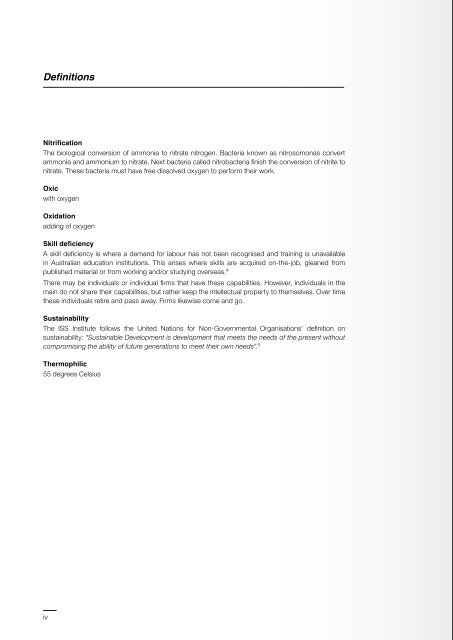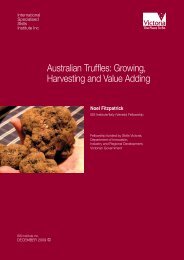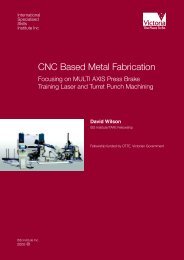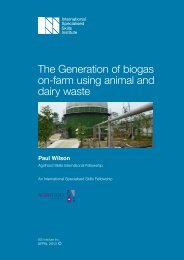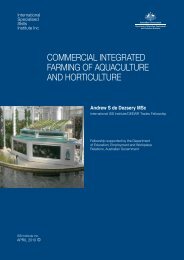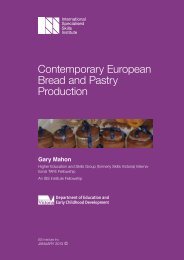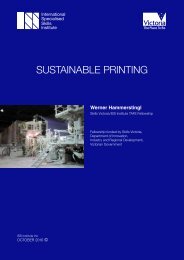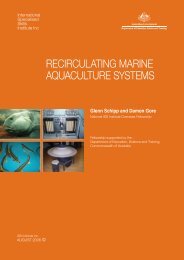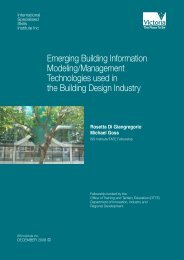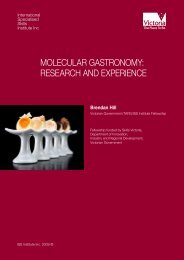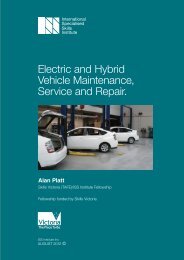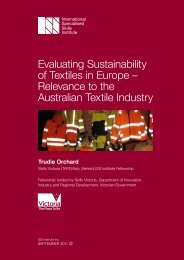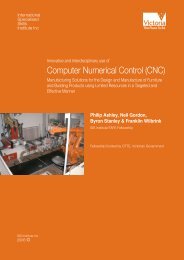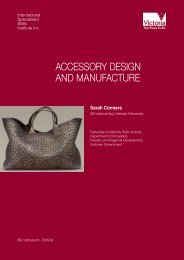Wastewater Treatment: Remote Control and Monitoring
Wastewater Treatment: Remote Control and Monitoring
Wastewater Treatment: Remote Control and Monitoring
Create successful ePaper yourself
Turn your PDF publications into a flip-book with our unique Google optimized e-Paper software.
DefinitionsAcknowledgementsNitrificationThe biological conversion of ammonia to nitrate nitrogen. Bacteria known as nitrosomonas convertammonia <strong>and</strong> ammonium to nitrate. Next bacteria called nitrobacteria finish the conversion of nitrite tonitrate. These bacteria must have free dissolved oxygen to perform their work.Oxicwith oxygenOxidationadding of oxygenSkill deficiencyA skill deficiency is where a dem<strong>and</strong> for labour has not been recognised <strong>and</strong> training is unavailablein Australian education institutions. This arises where skills are acquired on-the-job, gleaned frompublished material or from working <strong>and</strong>/or studying overseas. 4There may be individuals or individual firms that have these capabilities. However, individuals in themain do not share their capabilities, but rather keep the intellectual property to themselves. Over timethese individuals retire <strong>and</strong> pass away. Firms likewise come <strong>and</strong> go.SustainabilityThe ISS Institute follows the United Nations for Non-Governmental Organisations’ definition onsustainability: “Sustainable Development is development that meets the needs of the present withoutcompromising the ability of future generations to meet their own needs”. 5Thermophilic55 degrees CelsiusPaul Gray would like to thank the following individuals <strong>and</strong> organisations who gave generously of theirtime <strong>and</strong> their expertise to assist, advise <strong>and</strong> guide him throughout the Fellowship program.Awarding Body – International Specialised Skills Institute (ISS Institute)The International Specialised Skills Institute Inc is an independent, national organisation that for overtwo decades has worked with Australian governments, industry <strong>and</strong> education institutions to enableindividuals to gain enhanced skills <strong>and</strong> experience in traditional trades, professions <strong>and</strong> leadingedgetechnologies.At the heart of the ISS Institute are our Fellows. Under the Overseas Applied Research FellowshipProgram the Fellows travel overseas. Upon their return, they are required to pass on what they havelearnt by:1. Preparing a detailed report for distribution to government departments, industry <strong>and</strong> educationalinstitutions.2. Recommending improvements to accredited educational courses.3. Delivering training activities including workshops, conferences <strong>and</strong> forums.Over 200 Australians have received Fellowships, across many industry sectors. In addition, recognisedexperts from overseas conduct training activities <strong>and</strong> events. To date, 22 leaders in their field haveshared their expertise in Australia.According to Skills Australia’s ‘Australian Workforce Futures: A National Workforce DevelopmentStrategy 2010’:Australia requires a highly skilled population to maintain <strong>and</strong> improve our economic position in the face ofincreasing global competition, <strong>and</strong> to have the skills to adapt to the introduction of new technology <strong>and</strong>rapid change.International <strong>and</strong> Australian research indicates we need a deeper level of skills than currently exists in theAustralian labour market to lift productivity. We need a workforce in which more people have skills, butalso multiple <strong>and</strong> higher level skills <strong>and</strong> qualifications. Deepening skills across all occupations is crucial toachieving long-term productivity growth. It also reflects the recent trend for jobs to become more complex<strong>and</strong> the consequent increased dem<strong>and</strong> for higher level skills. This trend is projected to continue regardlessof whether we experience strong or weak economic growth in the future. Future environmental challengeswill also create dem<strong>and</strong> for more sustainability related skills across a range of industries <strong>and</strong> occupations. 6In this context, the ISS Institute works with Fellows, industry <strong>and</strong> government to identify specific skills inAustralia that require enhancing, where accredited courses are not available through Australian highereducation institutions or other Registered Training Organisations. The Fellows’ overseas experiencesees them broadening <strong>and</strong> deepening their own professional practice, which they then share with theirpeers, industry <strong>and</strong> government upon their return. This is the focus of the ISS Institute’s work.For further information on our Fellows <strong>and</strong> our work see http://www.issinstitute.org.au.Patron in ChiefLady Primrose Potter ACPatronMr Tony SchiavelloBoard MembersSir James Gobbo AC, CVOMs Sue ChristophersMr Franco FiorentiniMr Jack O’Connell AOMr David WittnerPatronMr James MacKenzieChairmanMr Mark Bennettsiv1


